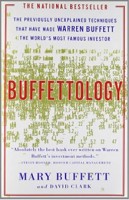As part of my recent quest for reading and learning a bit about economics of our world, and by recommendation of a friend who knows at least more than me about the topic, I went for a totally different read this time.
Review

Author(s): Mary Buffet, David Clark
What to buy? At what price? Seek the highest predictable annual compounding rate of return possible with the least amount of risk; benefit from the compounding effect of retained earnings, taking care about inflation and taxes; The price you pay determines your rate of return.
Previous paragraph was a small yet very relevant fragment of advices given in the book if you want to invest in a company. There are more, but these highlights provide a good summary. Written by a Buffet family member in the late nineties, explains in plain terms the basics of Warren Buffet's thinking, some of his investing techniques and a small framework to categorize, evaluate and judge if a company is worth an investment or not.
As another example, it suggests avoiding commodity business, trying to find consumer monopolies or "toll bridges", but more than 20 years later almost everyone will agree that this is not always clear to find. For example, when Google appeared wasn't a search and advertisement monopoly (and as of 2021 is losing ground on the advertisement business to Facebook and Amazon), and even companies that become part of a duopoly or oligopoly do so via insane amounts of invested money and are not yet profitable, so at least in the technological area Warren's concepts of searching for a company "with clean financials, good earnings and that is a monopoly" feels more of a holy grail (tell that to the venture capitals all over the world!).
Sorry, diverging outside of the book itself. In general, it is an interesting read, but parts of it are clearly obsolete. The listing of 54 interesting companies is a good example, despite still being interesting to read through. The authors tend to remark once and again and again a few topics, which isn't bad but becomes a bit repetitive, but even with that there are good general concepts to learn.
In my case, I'd choose the sentence "invest in companies that make products you understand" as something you can extrapolate to other areas.